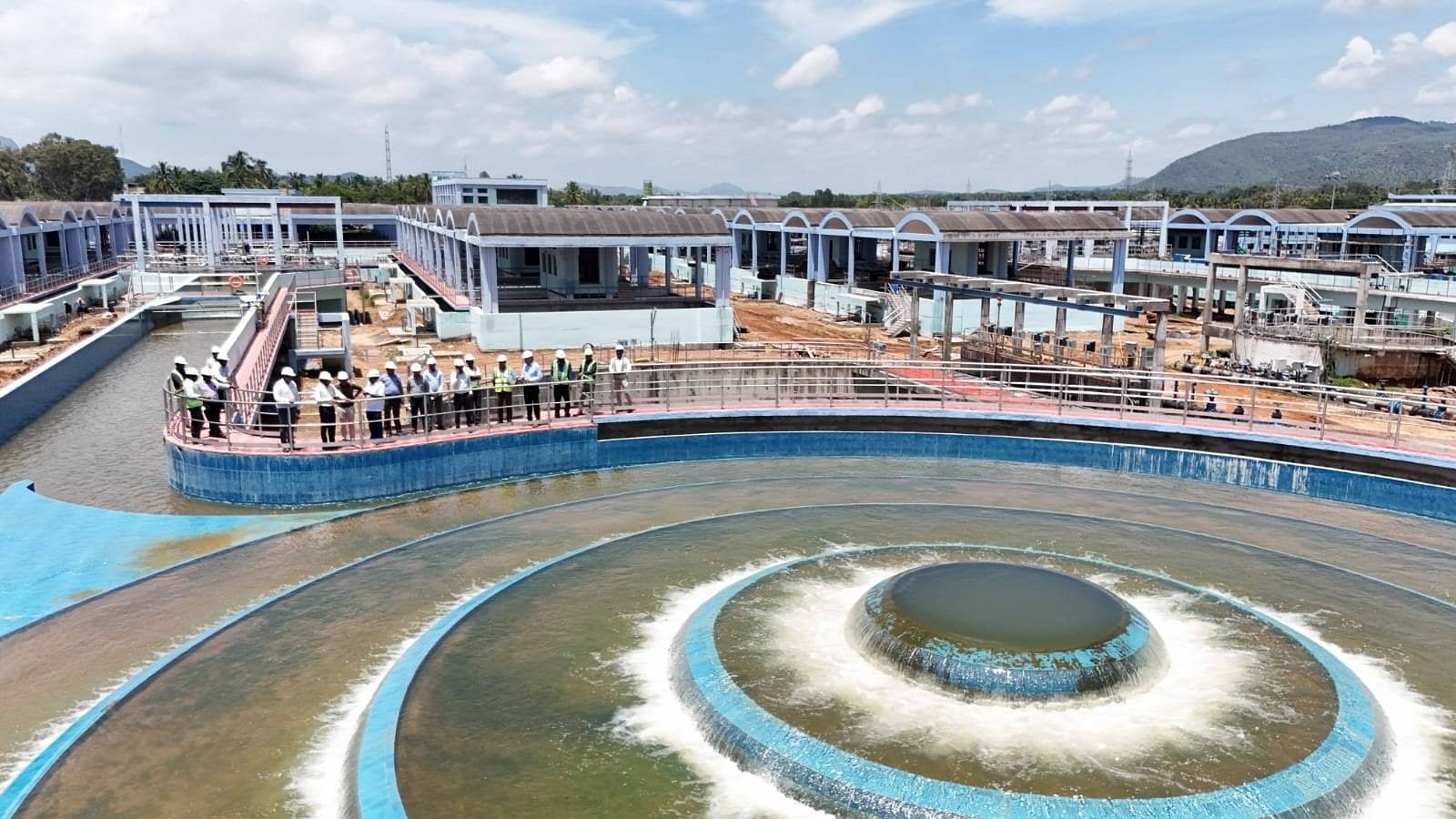
BWSSB’s recently launched Cauvery Stage V Project, which has the capacity to serve up to 4 lakh households or a population of 50 lakh.
Credit: DH PHOTO
Bengaluru: In the last 20 years, Diana Pais, a resident of Anjanadri Layout in Horamavu, has spent no less than Rs 15 lakh on drilling new borewells or repairing existing ones whenever they dried up.
The family now relies on a borewell that is approximately 1,500 feet below the surface, which is much deeper than the previous ones. When the government launched the fifth stage of the Cauvery Water Supply Scheme (CWSS), she was not elated, as her layout has yet to receive a water pipeline network.
This is not an isolated case. Lakhs of residents in the erstwhile 110 villages have yet to apply for water connections because the Bengaluru Water Supply and Sewerage Board (BWSSB) has not yet developed water supply infrastructure in their neighborhoods, a critical link from the house taps to BWSSB’s distribution lines.
Abhilash M, who lives in Brigade Cornerstone Utopia apartment in Varthur, said the residents would like to avail Cauvery connection but there is no clarity whether the BWSSB has created a common water supply network nearby. “So far, we have been dependent on private tankers. Whenever the BWSSB is ready with the connection, we will apply,” he said.
According to the BWSSB, the recently launched Cauvery Fifth Stage Project, which has a capacity of 775 million litres per day (MLD), can serve up to 4 lakh households or a population of 50 lakh. The project is designed to benefit residents across seven assembly constituencies in the city’s peripheral areas, including Byatarayanapura, Mahadevapura, Yeshwanthpur, and Dasarahalli.
While the BWSSB has built a 100-km transmission pipeline and pumping stations from TK Halli to the city, the work on building two separate trunk lines from Vajrahalli—one moving east towards Hoodi and the other north towards GKVK—is nearing completion. Officials are hopeful that the 53-km eastern line will be fully ready once it bridges the small gap at Gunjur and Kudlu, where it is required to break rock on a busy road. It is learned that the western line is more or less complete.
The city’s trunk lines are connected to ground-level reservoirs and a distribution network that branches out to residential areas.
New connections
So far, only 55,000 households—just about 13% of BWSSB’s total target—have been connected to the distribution network after paying the pro-rata charges. The water board collects about Rs 5,000 for providing a Cauvery connection to a building with ground plus one floor, and charges Rs 40 per square foot for additional built-up area. The charges vary if the building has more than one kitchen.
Some residents in South Bengaluru have received Cauvery water, but this is not the case for all 55,000 households.
Manjunath H, a resident of Banashankari 6th Stage Further Extension, said he has paid around Rs 35,000 to get the water connection, but BWSSB has yet to start the supply. “We have been waiting for Cauvery water for the last five years. In fact, the layout created a water distribution network about ten years ago. We do not know what condition these pipes are in now. There are around 8,000 sites in the layout with about 50% occupancy,” he explained.
The four-member family has been spending Rs 4,000 every month on water from private tankers ever since their borewell dried up just a year after it was dug.
The situation is similar for others. Kochu Sankar, a resident of Horamavu, has also been waiting for Cauvery water for the last four years. He obtained the connection after paying Rs 55,000 in 2019, but the water has yet to reach his taps.
“The BWSSB keeps announcing dates for supplying water. We are hearing that the pipeline work has been held up at a couple of places. We did not get water from Deepavali. Hope it reaches by Christmas or new year,” he said.
While residents living within BBMP limits or BDA-formed layouts are getting water connections easily, it has been learned that those in BDA limits are struggling to secure connections. In some instances, BWSSB has demanded an additional Rs 2 lakh per house on top of regular charges to provide water supply networks. Similarly, a residential society in East Bengaluru was asked to pay a Rs 1 crore bribe for a Cauvery water connection.
BWSSB’s chairman Ram Prasath Manohar said the trunk lines will be fully ready in a week’s time as the traffic police have given permission to break the rock by closing the road. “We will start engaging communities to increase the number of connections, which currently stands at 55,000. We will also make the process of applying for Cauvery water more transparent,” he said.
Apply for connection online
The BWSSB on Saturday asked residents to apply for the connection on its official website after it received complaints of intermediaries promising to provide Cauvery water by charging hefty bribes.
“Obtaining a Cauvery water connection is an easy process. Once applications are submitted online, BWSSB officials will proceed with the necessary steps as per the rules. Upon payment of legally levied charges to the BWSSB bank account, The new connections will be given in a hassle-free manner,” the BWSSB said.
The Board has also set up a specialised Vigilance Cell to investigate and resolve complaints related to unlawful demands. Concerned citizens can email complaints to bwssbvigilance@gmail.com.